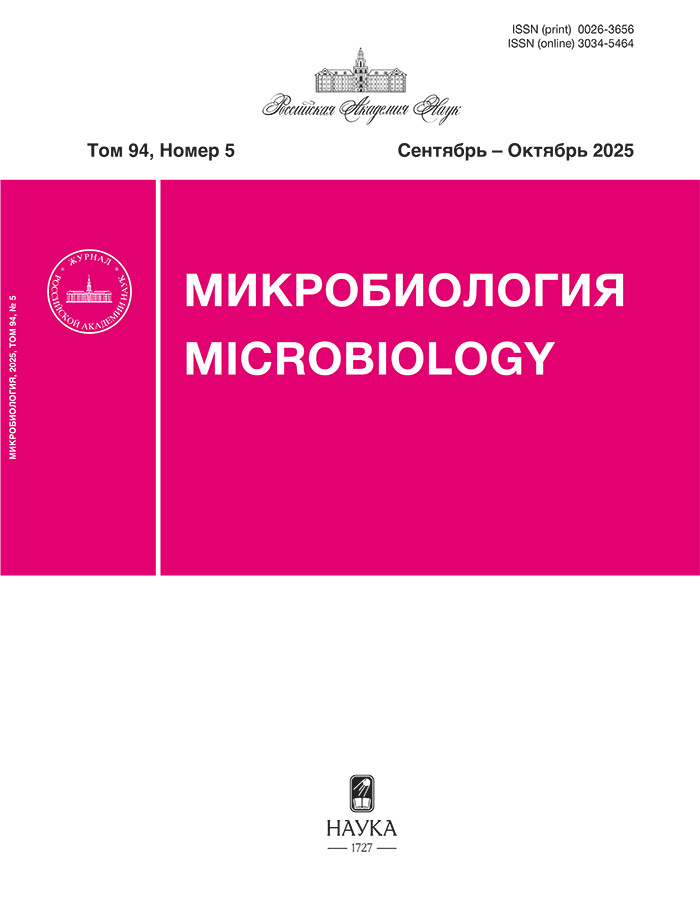Влияние биоаугментации Bacillus subtilis, Bacillus amyloliquefaciens, Pseudomonas aeruginosa на эффективность компостирования пищевых отходов
- Авторы: Миронов В.В.1, Щелушкина А.А.1, Острикова В.В.1, Клюкина А.А.1, Вантеева А.В.1, Мольдон И.А.1, Жуков В.Г.1, Котова И.Б.2, Николаев Ю.А.1
-
Учреждения:
- Институт микробиологии имени С.Н. Виноградского, Федеральный исследовательский центр “Фундаментальные основы биотехнологии” Российской академии наук
- МГУ имени М.В. Ломоносова
- Выпуск: Том 93, № 2 (2024)
- Страницы: 208-212
- Раздел: КРАТКИЕ СООБЩЕНИЯ
- URL: https://rjdentistry.com/0026-3656/article/view/655137
- DOI: https://doi.org/10.31857/S0026365624020209
- ID: 655137
Цитировать
Полный текст
Аннотация
Применение инокулята, содержащего автохтонные компостные микроорганизмы Bacillus subtilis, B. amyloliquefaciens, Pseudomonas aeruginosa, позволило усилить биодеградацию пищевых отходов при компостировании. Выживаемость интродуцированных микроорганизмов была проверена классическими микробиологическими и молекулярно-биологическими методами. Интродукция позволила продлить высокотемпературную стадию на 4 сут, предотвратить закисление среды, увеличить деградацию органического вещества и испарение влаги, что привело к уменьшению массы отходов на 51% за две недели. Интродуцированные P. aeruginosa, по всей видимости, играли ключевую роль на начальной стадии и не были обнаружены после повышения температуры до 60C.
Полный текст
Об авторах
В. В. Миронов
Институт микробиологии имени С.Н. Виноградского, Федеральный исследовательский центр “Фундаментальные основы биотехнологии” Российской академии наук
Автор, ответственный за переписку.
Email: 7390530@gmail.com
Россия, Москва, 119071
А. А. Щелушкина
Институт микробиологии имени С.Н. Виноградского, Федеральный исследовательский центр “Фундаментальные основы биотехнологии” Российской академии наук
Email: 7390530@gmail.com
Россия, Москва, 119071
В. В. Острикова
Институт микробиологии имени С.Н. Виноградского, Федеральный исследовательский центр “Фундаментальные основы биотехнологии” Российской академии наук
Email: 7390530@gmail.com
Россия, Москва, 119071
А. А. Клюкина
Институт микробиологии имени С.Н. Виноградского, Федеральный исследовательский центр “Фундаментальные основы биотехнологии” Российской академии наук
Email: 7390530@gmail.com
Россия, Москва, 119071
А. В. Вантеева
Институт микробиологии имени С.Н. Виноградского, Федеральный исследовательский центр “Фундаментальные основы биотехнологии” Российской академии наук
Email: 7390530@gmail.com
Россия, Москва, 119071
И. А. Мольдон
Институт микробиологии имени С.Н. Виноградского, Федеральный исследовательский центр “Фундаментальные основы биотехнологии” Российской академии наук
Email: 7390530@gmail.com
Россия, Москва, 119071
В. Г. Жуков
Институт микробиологии имени С.Н. Виноградского, Федеральный исследовательский центр “Фундаментальные основы биотехнологии” Российской академии наук
Email: 7390530@gmail.com
Россия, Москва, 119071
И. Б. Котова
МГУ имени М.В. Ломоносова
Email: 7390530@gmail.com
биологический факультет
Россия, Москва, 119991Ю. А. Николаев
Институт микробиологии имени С.Н. Виноградского, Федеральный исследовательский центр “Фундаментальные основы биотехнологии” Российской академии наук
Email: 7390530@gmail.com
Россия, Москва, 119071
Список литературы
- Awasthi M.K., Pandey A.K., Bundela P.S., Khan J. Co-composting of organic fraction of municipal solid waste mixed with different bulking waste: characterization of physicochemical parameters and microbial enzymatic dynamic // Bioresour. Technol. 2015. V. 182. P. 200–207.
- Ballardo C., Barrena R., Artola A., Sánchez A. A novel strategy for producing compost with enhanced biopesticide properties through solid-state fermentation of biowaste and inoculation with Bacillus thuringiensis // Waste Manage. 2017. V. 70. P. 53–58.
- Bhattacharya A., Pletschke B. Thermophilic Bacilli and their enzymes in composting // Composting for sustainable agriculture. 2014. V. 3. P. 103–124.
- Chang Y., Zhou K., Yang T., Zhao X., Li R., Li J., Xu S., Feng Z., Ding X., Zhang L., Shi X., Su J., Li J., Wei Y. Bacillus licheniformis inoculation promoted humification process for kitchen waste composting: Organic components transformation and bacterial metabolic mechanism // Environmental Research. 2023. V. 237. № 2. P. 15.
- Gibello A., Vela A.I., Martín M., Mengs G., Alonso P.Z., Garbi C., Fernández-Garayzábal J.F. Pseudomonas composti sp. nov., isolated from compost samples // Int. J. Syst. Evol. Microbiol. 2011. V. 61. P. 2962–2966.
- Grgić D.K., Domanovac M.V., Domanovac T. et al. Influence of Bacillus subtilis and Pseudomonas aeruginosa BSW and clinoptilolite addition on the biowaste composting process // Arab. J. Sci. Eng. 2019. V. 44. P. 5399–5409.
- Lei F., Gheynst J.S.V. The effect of microbial inoculation and pH on microbial community structure changes during composting // Process Biochem. 2000. V. 35. P. 923–929.
- Li C., Li H., Yao T., Su M., Ran F., Han B., Li J. Microbial inoculation influences bacterial community succession and physicochemical characteristics during pig manure composting with corn straw // Bioresour. Technol. 2019. V. 289. Art. 121653.
- Mironov V., Vanteeva A., Merkel A. Microbiological activity during co-composting of food and agricultural waste for soil amendment // Agronomy. 2021. V. 11. Art. 928.
- Moreno J., López-González J.A., Arcos-Nievas M.A., Suárez-Estrella F., Jurado M.M., Estrella-González M.J., López M.J. Revisiting the succession of microbial populations throughout composting: a matter of thermotolerance // Sci. Total Environ. 2021. V. 773. Art. 145587.
- Nakasaki K., Araya S., Mimoto H. Inoculation of Pichia kudriavzevii RB1 degrades the organic acids present in raw compost material and accelerates composting // Bioresour. Technol. 2013. V. 144. P. 521–528.
- Niu J., Li X. Effects of microbial inoculation with different indigenous Bacillus species on physicochemical characteristics and bacterial succession during short-term composting // Fermentation. 2022. V. 8. Art. 152.
- Sharma P., Melkania U. Effect of bioaugmentation on hydrogen production from organic fraction of municipal solid waste // Int. J. Hydrogen Energy. 2018. V. 43. P. 7290–7298.
- Song C., Li M., Qi H., Zhang Y., Liu D., Xia X., Pan H., Xi B. Impact of anti-acidification microbial consortium on carbohydrate metabolism of key microbes during food waste composting // Bioresour. Technol. 2018. V. 259. P. 1–9.
- Tyagi M., da Fonseca M.M.R., de Carvalho C.C.C.R. Bioaugmentation and biostimulation strategies to improve the effectiveness of bioremediation processes // Biodegradation. 2010. V. 22. P. 231–241.
- Wan L., Wang X., Cong C., Li J., Xu Y., Li X., Hou F. Effect of inoculating microorganisms in chicken manure composting with maize straw // Bioresour. Technol. 2020. V. 301. Art. 122730.
- Xi B., Zhang G., Liu H. Process kinetics of inoculation composting of municipal solid waste // J. Hazard. Mater. 2005. V. 124. P. 165–172.
- Zhong B., An X., An W., Xiao X., Li H., Xia X., Zhang Q. Effect of bioaugmentation on lignocellulose degradation and antibiotic resistance genes removal during biogas residues composting // Bioresour. Technol. 2021. V. 340. Art. 125742.
Дополнительные файлы












